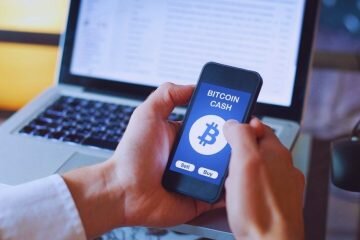Blockchain Revolution: What Exactly Is It?
The Internet is excellent for cooperation and communication, as we know it, but is fundamentally defective in business and privacy. The new blockchain technology makes transactions between peers possible without a middleman like a bank or a regulatory authority. What is The Blockchain Revolution? If the user’s data is held anonymous, the Blockchain confirms and records all transactions permanently.
This implies that your personal data is secure, confidential, and all activities are visible and incorruptible – resolved through mass cooperation and saved on a digital directory as code.With its coming, we don’t have to have confidence in the conventional sense since confidence is embedded into the system itself. While the Blockchain’s potential requires a digital currency, Bitcoin is simply one application in computer science of this tremendous breakthrough. The Blockchain may include any legal documents, from certificates and marriage certificates to education and birth certificates.
It enables intelligent contracts, decentralized self-governing groups, decentralized government services and transactions. The Internet requires a newsletter of all: the Blockchain is a genuinely open, distributed worldwide platform that radically alters what we can accomplish online.
What is all about Blockchain? Blockchain Revolution
Satoshi Nakamoto, a pseudonym for invented the technology in 2008, was assigned the blockchain idea. The first Blockchain established was meant to promote digital bitcoin cryptocurrency by recording every bitcoin transaction securely, regardless of the necessity for a bank or financial middleman. But the usage of blockchains in business has reached well beyond recording fundamental financial transactions throughout the previous decade.
Technology and architecture
Are you not clear on What is The Blockchain Revolution? Well! Blockchain technology is currently utilized to record various types of information, from medical records to passport applications. Blockchains improve company efficiency because they minimize the expense of costly middlemen, thereby eliminating duplication of work. Just put, a blockchain is an unchangeable digital directory that can record controlled transactions and monitor assets throughout a decentralized network. Virtually any value item may be exchanged, transferred, and monitored via a blockchain, which inherently decreases the risks and costs of everybody parties. The assets might be material or intangible, like identity, for example, property.
In practice, a blockchain maintains information via a computer network; nobody owns the system, but everyone may use it and assist in managing it. As a result, editing a block and corrupting the contents or Blockchain is very difficult for any individual. Unlike corporate systems, where the rule is that all company data and information with a central processor is secure for one central database, blockchain technology demands that all blocks of data be kept on each machine in the blockchain blockade. The Peer-to-Peer network setup enables the security provided in a blockchain system, with autonomous and decentralized block data storage.
The Blockchain design allows all parties to share a block that is being synchronized each time a transaction takes place. This method means that every network participant functions as a contributor to all the information in the network and a subscriber. The data is immediately synced throughout the Blockchain when transported, and participants can receive or send transactions to others by adding blocks.
A blockchain’s main characteristics
A blockchain has many key properties which distinguish it from conventional trading systems:
- Single source: the shared blockchain ledger gives participants a place for determining if a transaction is completed or whether a property is owned.
- Consensus: all participants must agree upon the legitimacy of any single blockchain transaction.
- Origin: everyone knows where any assets come from and how their owners may have changed over time.
- Integrity: After recorded in the blockchain ledger, no participant may mingle with a transaction. If a transaction is improperly recorded Or an additional transaction to counter the entry, with both of the transactions open to all participants, must be posted to the Blockchain in mistake.
So unbelievably secure, Blockchain?
Three factors contribute to the security of Blockchain. It must have a unique digital fingerprint, called a hash and the hash on a preceding block, before a block of information may be added to the Blockchain. The hash is a unique encryption code identifying a block and its whole contents. What is The Blockchain Revolution? Any effort to modify the content of the blocks will thus change the hash such that it is no longer verified inside the chain.
A blockchain needs ‘work testing’, a transaction-confirmation mechanism used to generate new blocks for the network. This procedure slows down for several minutes the development of a new block. Therefore, it would be exceedingly difficult to manipulate the content of a block as the proof of work for every following block in the chain would require a change, which might be several thousand. Because of the time involved, this is not unnoticed.
The peer distribution is synchronized into peer networks. Each user has to validate the block and then include it in the chain, commonly called a node. To jeopardize the completeness of the Blockchain, all nodes must agree to take the same measures simultaneously, which is fairly difficult because everyone acts independently and transparently.
Blockchain’s Future
Blockchain’s broad application of technology in the banking sector will not be restricted to digital money. In various industries, from smart contracts for chain management to digital advertising and the Internet of Things, it has an important future. Some governments have taken on the technology of Blockchain. Estonia, for instance, has tested the value of Blockchain over a decade, and today for legislative, health and finance purposes, it is a significant element of Estonian data registers. What is The Blockchain Revolution? Despite the capacity of blockchain technology to bring enormous benefits, not all world governments are on a par with it. The technical changes that this specific technology might bring are more accepted by governments, while others lag.
It is worth stressing that while world governments are usually open to decentralized database technology, their positions on the usage of crypto-monetary legislation may differ. National regulators focus on ways to deal with technology and draw up appropriate rules to hamper their growth and foster the social effect of blockchain technology.
Blockchain strategic management (SBL)
An SBL examination could require a candidate to analyse a situation in which a particular organization has infiltrated or hacks its information systems, or if customers or customers complain that their records are not visible to them and that the company may be reputationally damaged because its stakeholders are not transparent enough. The solution might be to advocate blockchain installation with rationale in whole or part. Suppose blockchain technology is to be implemented in medical records. In that case, it will benefit, for instance, if prior records could never be modified by someone other than the individual to whom the record is linked, such as the particular patient and his/her doctor, entirely inaccessible. Although patients are permitted independently to enter their own historical and current information, they cannot modify their records or access or modify any medical data of anybody else for purposes of openness.
Also Check: Blockchain Customer Service
Beneficial force Blockchain
Blockchain networks can govern how agreements between parties are implemented via smart contracts, in addition to assuring the company may be managed following a single and most comprehensive truth. Blockchain-traded assets may have their inviolable conditions of usage. Intelligent contracts force Goliath to treat David as honestly as its corporate titans would.
Democratizing the law can help the developers and authors of exploited assets. Smart blockchain contracts might one day replace intermediate platforms for the sharing economy, guaranteeing that participants are rewarded properly for the value they generate. Consider the distress that independent musicians have, now that album sales have dried up throughout the business, must live on the road to make ends meet. A musical database that employs smart contracts to overcome industry obstacles between artists and their legal earnings, singer-songwriter Imogen Heap is the force behind Creative Passport. Automated transactions on the Blockchain can alter our inefficient relationship with energy with help from the Internet of Things. A decentralized peer-to-peer energy sector offers the Australian firm Power Ledger an Enterprise Blockchain Award in creative entrepreneurship. It supports not only the adoption of renewable energy sources but also more efficient grid energy distribution.
Concluding notes
Finally, but not least, Blockchain can assist rekindle democracy’s credibility. Why do we still have to line at an office to vote on voting day, frequently for hours? More voting utilizing internet access would lead to the democratic fold of unfathomable millions of individuals, especially young ones. But without cutting-edge blockchain cryptography, a completely virtual system may not earn public confidence to prevent cyber-meddling. In addition, we may generate voting as smart agreements that oblige victorious politicians to fulfill their campaign pledges and platform.
Some very significant things happen, for example, in supply networks. The composite trail of the necessary documents in the logistical sector – for example, loading letters, export license and origin certificates – may be used in a blockchain in a network state. This implies that suppliers, buyers and consumers all have the same, unmodified and accurate information about the status and provenance of the items. Users can brighten up the darker corners of the industry using blockchain.
Post Disclaimer
Disclaimer:
We are do not represent any exchange, cryptocurrency, wallet, coins, token etc., We are a non-profitable blog providing information’s only.
Please note that we will never ask for your wallet address, any money or cryptocurrency. We do NOT offer any token sales, trades or airdrops through this blog. Please stay safe and be aware of scammers. The content within this blog are solely for educational and entertainment purposes. We are not a financial advisor nor a legal counsellor. A crypto fanatic who loves blockchain technology, because we truly believe it will change the world. So please do your own research and be fully aware of the risks involved when investing in any such cryptocurrencies and or platforms! Cryptocurrencies are extremely volatile digital assets and come with major risks!


